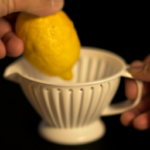Juice Tips and Tricks
How Much Is Juice From One Lemon
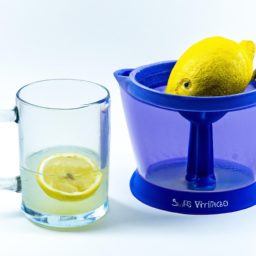
Being a cooking and baking enthusiast, I love adding a splash of **acid** and flavor to my dishes using lemons. However, it can be frustrating when you cut into a lemon and get very little juice. This got me wondering about how much juice you can get from one lemon and what factors affect the amount of juice you get. If you want to avoid disappointment in the kitchen and make the most of your lemons, keep reading to learn some surprising **tips** and tricks!
In this article, I will explore the science behind lemon juice yield and share tips for getting the most juice out of your lemons. We’ll also discuss the various ways to use lemon juice in cooking and baking, and explore some common myths about lemon juice.
Whether you’re a seasoned chef or just starting out in the kitchen, understanding how much juice you can expect from a lemon can help you make the most of this versatile ingredient.
Key Takeaways
- The amount of juice from one lemon varies depending on the ripeness and size of the fruit, with ripe lemons yielding more juice due to thinner skin and softer texture.
- Using a citrus squeezer and mesh strainer can maximize juice extraction, and experimenting with the amount of pressure applied can also affect yield.
- Acidic varieties of lemons tend to yield more juice, and the juicing method used can also impact yield.
- To store lemon juice, it is recommended to keep it in an airtight container in the fridge with the date labeled, and it can also be frozen in ice cube trays for later use.
Factors that Affect Lemon Juice Yield
The amount of juice extracted from a lemon can be influenced by various factors, such as the ripeness of the fruit and the amount of pressure applied during squeezing.
When it comes to lemon juice extraction, the ripeness of the fruit plays a crucial role in the amount of juice yield. A ripe lemon tends to have more juice than an unripe one. This is because a ripe lemon has a thinner skin and is softer, making it easier to squeeze and extract juice.
Another factor that affects lemon juice yield is the amount of pressure applied during squeezing. Applying too much pressure can actually decrease the amount of juice yield since it can cause the bitter-tasting compounds in the lemon peel to mix with the juice. On the other hand, applying too little pressure can result in less juice yield. Therefore, it’s important to apply just the right amount of pressure to maximize the amount of juice extracted from the lemon.
With these factors in mind, let’s explore the average lemon juice yield.
Average Lemon Juice Yield
On average, you can squeeze about half an ounce of lemon juice from a single fruit, which may vary depending on its size and ripeness. However, there are several factors that can affect lemon juice extraction and measurement. Here are three examples:
-
Size: Bigger lemons tend to have more juice than smaller ones. Therefore, you may need multiple small lemons to yield the same amount of juice as one large lemon.
-
Ripeness: Ripe lemons are juicier than unripe ones. The skin of a ripe lemon is also thinner, making it easier to extract juice.
-
Juicing method: Different techniques for juicing lemons can affect how much juice you get. For example, using a citrus squeezer is more efficient than hand-squeezing, and microwaving the lemon for a few seconds before squeezing can help release more juice.
Knowing these factors can help you get the most out of your lemons. In the next section, I’ll share some tips for getting the most juice out of your lemons.
Tips for Getting the Most Juice
To maximize your lemony goodness, try using a lemon squeezer and squeezing your citrus over a mesh strainer placed over a bowl to catch any seeds or pulp. This will help ensure that you get the most juice out of your lemon and that it’s as pure as possible.
Additionally, try using acidic lemon varieties like Eureka or Lisbon lemons, which tend to have a higher juice yield than sweeter varieties like Meyer lemons.
When using lemon juice in cooking and baking, it’s important to keep in mind that the acidity of lemon juice can affect the outcome of your dish. Too much lemon juice can make a dish too tart, while too little can result in a lack of flavor.
Experiment with different amounts and taste as you go to find the perfect balance.
Using Lemon Juice in Cooking and Baking
When life gives you lemons, using their juice in cooking and baking can elevate the flavors of your dishes and desserts. Lemon juice is a versatile ingredient that can be used in cocktails, salad dressings, marinades, and sauces. Its acidity adds brightness and depth to any recipe, making it a popular ingredient in many kitchens.
In cocktails, lemon juice is often used to balance the sweetness of other ingredients and add a refreshing kick. It can also be used as a base for homemade lemonade or as a substitute for lime in drinks like margaritas.
When incorporating lemon juice into salad dressings, it can add a zesty tanginess that complements the flavors of the vegetables. Lemon juice can also be used to tenderize meat in marinades or to add a bright flavor to sauces like hollandaise. The possibilities are endless with this versatile ingredient.
When it comes to storing lemon juice, there are a few steps you can take to keep it fresh. One option is to freeze the juice in ice cube trays, which can then be easily added to recipes as needed. Another option is to store the juice in an airtight container in the fridge for up to a week.
With these storage tips in mind, you can always have a fresh supply of lemon juice on hand for all your culinary adventures.
Storing Lemon Juice
Make sure you keep your lemon juice fresh by following these simple steps for storing it. Storing lemon juice properly is important in preserving its freshness and flavor. Here are some tips on how to do it:
- Store freshly squeezed lemon juice in an airtight container. Glass jars or bottles with tight-fitting lids are ideal for this purpose.
- Refrigerate the container of lemon juice immediately after squeezing. This will slow down the oxidation process and prevent the juice from spoiling quickly.
- Label the container with the date the juice was squeezed. This will help you keep track of its freshness and ensure that you use it before it goes bad.
By following these steps, you can prolong the life of your lemon juice and ensure that it stays fresh for longer.
Now that you know how to store lemon juice properly, let’s explore some alternative citrus juices that you can use in your cooking and baking.
Alternative Citrus Juices
As I explore alternative citrus juices, I can’t overlook the tangy and acidic lime juice. It has a distinct flavor and aroma that are commonly used in various cuisines and drinks.
Another citrus juice worth considering is orange juice. It is a rich source of vitamin C and antioxidants.
Lastly, grapefruit juice is known for its bitter-sweet taste and potential health benefits. These benefits include weight loss and improved insulin resistance.
Lime Juice
You’ll be surprised at how much zing just a small squeeze of lime juice can add to your favorite dishes! Not only is lime juice a great addition to classic Mexican dishes like guacamole, but it can also be used to add acidity and brightness to seafood, salads, and even cocktails.
But did you know that lime juice also has some impressive benefits for your skin? Lime juice can help brighten and even out skin tone thanks to its high vitamin C content. It can also help reduce the appearance of dark spots and blemishes. This is because lime juice contains citric acid, which is known for its exfoliating properties.
Looking for a refreshing and healthy way to start your day? In the next section, we’ll explore the benefits of orange juice and how it can help boost your immune system.
Orange Juice
Get ready for a burst of vitamin C because we’re diving into the benefits of orange juice and how it can give your immune system a boost. Oranges are a great source of vitamin C, which is essential for a healthy immune system. Just one cup of orange juice contains about 124 mg of vitamin C, which is more than the recommended daily intake for adults. In addition to vitamin C, orange juice also contains other important nutrients such as potassium, folate, and thiamine.
To add even more health benefits, consider adding ginger to your orange juice. Ginger has anti-inflammatory properties and can help reduce nausea and improve digestion. Simply grate a small amount of ginger and mix it into your orange juice for a refreshing and healthy drink. And if you’re looking for a fun way to enjoy your orange juice, try mixing it into a cocktail. Some popular options include the Tequila Sunrise and the Screwdriver.
Speaking of cocktails, let’s move on to the next section and talk about grapefruit juice.
Grapefruit Juice
Let’s explore the tangy and refreshing world of grapefruit juice and discover its unique health benefits. As a citrus fruit, grapefruit has a high level of vitamin C, which is important for immune system health and collagen production.
Additionally, grapefruit contains antioxidants, such as lycopene and vitamin A, that can help reduce inflammation and protect against certain types of cancer.
When it comes to juice quality, grapefruit juice is best when it’s freshly squeezed. The nutritional value of the juice decreases over time, so it’s important to consume it as soon as possible after it’s made.
Adding sugar to grapefruit juice can also decrease its nutritional value, so it’s best to enjoy it without any added sweeteners.
With its unique tart flavor and impressive health benefits, grapefruit juice is a delicious and nutritious addition to any diet.
Speaking of citrus, let’s now move onto the topic of lemon zest.
Lemon Zest
If you’re feeling adventurous in the kitchen, adding a touch of lemon zest to your recipe can really spice things up and give it that extra kick!
Lemon zest is the yellow outer layer of the lemon peel, and it’s packed with flavor and nutrients. Not only does it add a bright, citrusy taste to dishes, but it also contains beneficial compounds like limonene and citral. These compounds have been shown to have anti-inflammatory and antioxidant properties, making lemon zest a great addition to a healthy diet.
Aside from its culinary uses, lemon zest is also a popular ingredient in natural health remedies. The essential oil derived from lemon zest is believed to have a range of benefits, including improving digestion, reducing stress, and boosting energy levels. Its antimicrobial properties also make it a popular choice for cleaning and disinfecting surfaces.
With all these benefits, it’s no wonder that lemon zest is a staple in many kitchens and natural health routines. Speaking of health benefits, let’s explore the benefits of lemon juice in the next section.
Lemon Juice Health Benefits
Lemon juice’s health benefits go beyond just adding flavor to your dishes. In fact, it contains a high level of antioxidants that can help protect your body from harmful free radicals. These antioxidants are known to reduce the risk of chronic diseases such as cancer and heart disease.
Additionally, lemon juice is a great source of vitamin C, which is essential for a healthy immune system. Furthermore, lemon juice can also benefit your skin health. The vitamin C found in lemon juice can help boost collagen production, which is essential for skin elasticity and reducing the appearance of fine lines and wrinkles.
Additionally, lemon juice has natural astringent properties that can help tighten pores and reduce excess oil on the skin’s surface. So, not only is lemon juice a delicious addition to your meals, but it also has numerous health benefits for your body and skin.
As we’ve learned about the health benefits of lemon juice, let’s now dive into some common myths about this citrus fruit and its juice.
Lemon Juice Myths
I’ve always heard that lemon juice can help with weight loss, detoxification, and acidity. But, are these claims actually true? Let’s dive into the science behind these myths.
First, let’s explore whether lemon juice can really help with shedding those extra pounds.
Next, we’ll discuss its supposed detoxifying properties and whether they hold any merit.
Finally, we’ll examine whether drinking lemon juice actually makes our bodies more acidic or if that’s just a common misconception.
Lemon Juice and Weight Loss
You can easily incorporate lemon juice into your weight loss journey by adding it to your water or using it as a salad dressing. Lemon juice contains citric acid, which has been found to boost metabolism. When consumed regularly, it can help increase the rate at which your body burns fat.
Additionally, lemon juice can aid in digestion by stimulating the production of bile, which helps break down food in the stomach. It’s important to note, however, that lemon juice alone cannot guarantee weight loss. It should be used in conjunction with a healthy diet and exercise routine.
Furthermore, excessive consumption of lemon juice can lead to tooth enamel erosion and acid reflux. As with any dietary changes, it’s important to consult with a healthcare professional before making any significant changes to your diet. With that being said, incorporating moderate amounts of lemon juice into your diet can be a beneficial addition to your weight loss journey.
Moving on to the next section about lemon juice and detox, it’s important to understand the potential benefits and limitations of using lemon juice as a detox agent.
Lemon Juice and Detox
I’ve always known that lemon juice isn’t only a great source of vitamin C, but it also has several health benefits. In the previous subtopic, we talked about how lemon juice can aid in weight loss.
Now, let’s dive into another benefit of lemon juice – detoxification.
Lemon water benefits our bodies in many ways, and one of them is by helping us cleanse our system. Lemon juice contains citric acid, which stimulates the liver to produce more bile, aiding in digestion. Moreover, it also acts as a natural diuretic, flushing out toxins from the body.
Drinking lemon water regularly can help with bloating, constipation, and other digestive issues. The lemon juice cleanse is a popular detox method that involves drinking lemon water for a few days to eliminate toxins from the body and promote overall health.
Incorporating lemon juice into your daily routine can have lasting benefits for your health.
Moving on to the next subtopic, let’s explore how lemon juice affects acidity in our body.
Lemon Juice and Acidity
Lemon juice can affect the acidity levels in our body, with a pH of 2-3, making it highly acidic. This acidity can have an impact on our skin and hair.
When applied topically, lemon juice can act as a natural astringent and help to tighten and brighten skin. However, it’s important to note that lemon juice can also cause skin irritation and sensitivity, especially for those with sensitive skin. It’s always recommended to dilute lemon juice with water before applying it to your skin.
In terms of hair, lemon juice can be used as a natural clarifying agent to remove buildup and excess oil. It can also lighten hair when exposed to sunlight. However, it’s important to be cautious when using lemon juice on your hair, as the high acidity can cause damage and dryness if overused. It’s best to mix lemon juice with a carrier oil or conditioner before applying it to your hair, and to limit its use to once a week or less.
Overall, while lemon juice can have benefits for our skin and hair, it’s important to use it in moderation and with caution.
Frequently Asked Questions
How many lemons does it take to make a cup of lemon juice?
I typically use about 5-6 lemons to make one cup of lemon juice. However, there are lemon juice substitutes available if you don’t have enough lemons. Lemon juice is a versatile ingredient and can be used in various recipes.
Can I use bottled lemon juice instead of fresh lemon juice in recipes?
Oh sure, you can definitely use bottled lemon juice instead of fresh lemon juice. But why settle for something that’s been sitting on a shelf for who knows how long when you can enjoy the benefits of using fresh lemon juice? It’s packed with Vitamin C, antioxidants, and has a bright, zesty flavor that can’t be beat. Plus, you never know what kind of preservatives or additives are lurking in that bottled stuff. Trust me, your taste buds (and your health) will thank you for squeezing your own lemons.
Is it better to hand-squeeze lemons or use a juicer?
Based on my experience, using a juicer yields higher quality lemon juice than hand squeezing. The juicer extracts more juice and avoids the bitter taste from the peel. However, the amount of juice per lemon may vary.
Can I freeze fresh lemon juice for later use?
Yes, fresh lemon juice can be frozen for later use. To preserve its quality, consider freezing in ice cube trays or airtight containers. Thaw in the fridge or at room temperature. Avoid refreezing.
How long does freshly squeezed lemon juice last in the fridge?
Wow, freshly squeezed lemon juice is like liquid gold! It lasts up to 2 weeks in the fridge, but adding a dash of citric acid can extend its shelf life. Properly storing lemon juice in an airtight container is key to preventing expiration.
Conclusion
In conclusion, the amount of juice that you can get from one lemon can vary depending on several factors such as the size, ripeness, and juiciness of the fruit. On average, a standard-sized lemon can yield around 2-3 tablespoons of juice. However, you can maximize the amount of juice you can get from each lemon with the right techniques and tools. For instance, rolling the lemon on the countertop before cutting it helps break down the membranes, making it easier to extract more juice. Additionally, using a citrus juicer or reamer can significantly increase the juice yield from one lemon, ensuring you get the most out of every squeeze. By combining these methods, you can make the most of each lemon, regardless of its natural variability.
Whether you’re using lemon juice for cooking, baking, or for its health benefits, it’s important to know how to properly store it to maintain its freshness and flavor. Additionally, if you’re looking for alternative citrus juices, you can try using lime, grapefruit, or even orange juice.
Regardless of how you choose to use it, lemon juice is a versatile ingredient that can add a burst of flavor and nutrition to any dish.
Cindy thoroughly researches juicing trends, techniques, and recipes to provide readers with practical advice and inspiration. Her writing style is accessible, engaging, and designed to make complex concepts easy to understand. Cindy’s dedication to promoting the advantages of juicing shines through her work, empowering readers to make positive changes in their lives through the simple act of juicing.
Juice Tips and Tricks
How to Make Aloe Vera Juice Taste Better

Tired of the strong flavor of aloe vera juice? No problem, we’ve got the answer for you.
In this article, we’ll share some tips and tricks to make your aloe vera juice taste better. We have tried and tested various methods to enhance the flavor without compromising the health benefits.
From choosing the right juice to adding natural sweeteners and infusing with fruits and herbs, we’ve got all the information you need to transform your aloe vera juice into a delightful and refreshing beverage.
Let’s dive in!
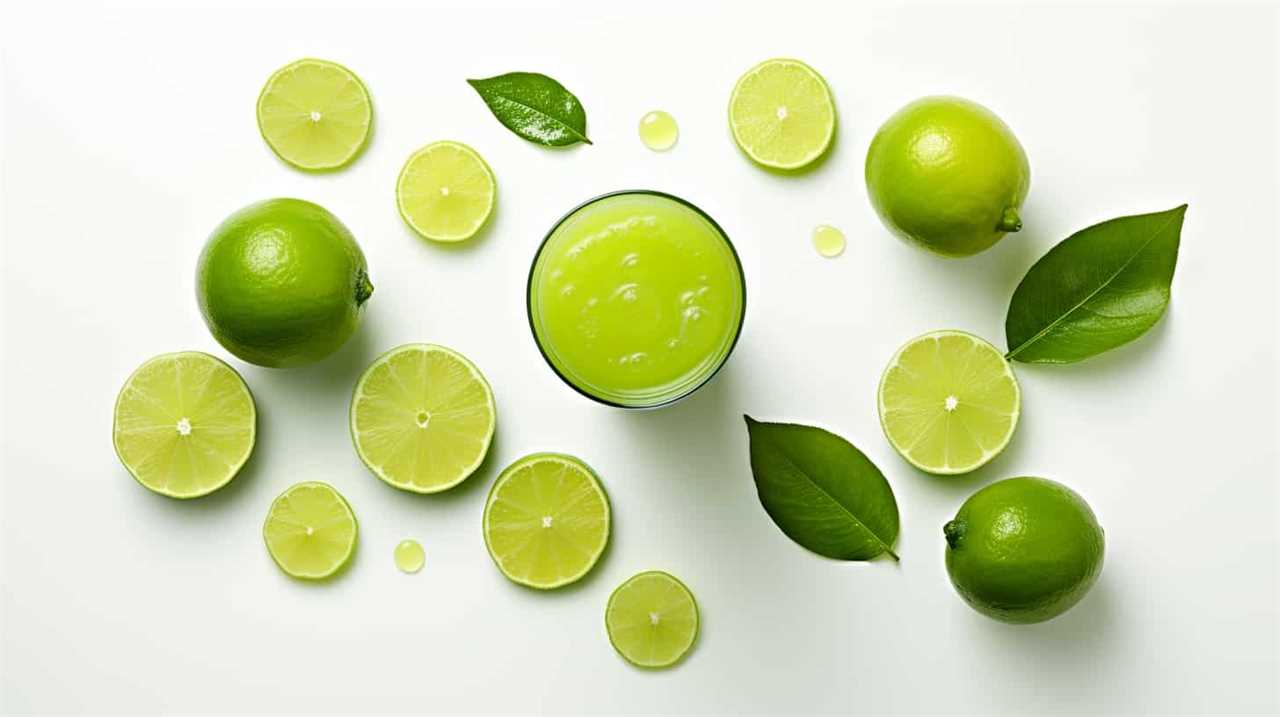
Key Takeaways
- Choose a reputable brand of aloe vera juice that prioritizes quality and uses organic, pure aloe vera.
- Avoid brands that contain added sugars or artificial ingredients.
- Use natural sweeteners like honey, agave syrup, or stevia to enhance the taste of aloe vera juice.
- Experiment with adding fruits, herbs, and other juices to create unique flavor combinations and enhance the health benefits of aloe vera juice.
Choosing the Right Aloe Vera Juice
We can enhance our experience with aloe vera juice by selecting the right brand and type for our preferences. When it comes to finding a reputable brand, it’s important to do some research and read reviews from other consumers. Look for brands that prioritize quality and use organic, pure aloe vera without any added sugars or artificial ingredients. Understanding the health benefits of aloe vera juice is also crucial in making the right choice. Aloe vera is known for its soothing properties, aiding digestion, promoting skin health, and boosting the immune system. By choosing a high-quality brand, we can ensure that we’re getting the maximum benefits from our aloe vera juice.
Now that we know how to choose the right brand, let’s move on to the next step of adding natural sweeteners.
Adding Natural Sweeteners
To enhance the flavor of our aloe vera juice, we can add natural sweeteners such as honey or agave syrup. Using alternative sweeteners not only adds sweetness but also brings unique flavors to the juice. Here are some options to consider:
- Stevia: A natural sweetener derived from the Stevia plant, it’s a zero-calorie alternative to sugar.
- Maple Syrup: This natural sweetener adds a rich and earthy flavor to the aloe vera juice.
- Dates: Pureed dates can be used to sweeten the juice while also providing essential nutrients like fiber.
In addition to using alternative sweeteners, we can enhance the flavor of aloe vera juice by adding spices and extracts. Cinnamon, ginger, or vanilla extract can add warmth and depth to the taste. By experimenting with different combinations of these natural sweeteners, spices, and extracts, we can create a flavor profile that suits our preferences.

Now, let’s move on to the next section and learn how to infuse aloe vera juice with fruits and herbs to further enhance its taste.
Infusing With Fruits and Herbs
As we explore ways to make our aloe vera juice taste better, one option to consider is infusing it with fruits and herbs. Creating unique aloe vera blends by adding fruits and herbs not only enhances the flavor but also adds a touch of freshness and complexity to the juice. For example, combining aloe vera juice with lemon, mint, or berries can create a refreshing drink that’s both delicious and packed with additional nutrients. It’s similar to the ease of making lemonade with bottled juice—quick, convenient, and customizable to suit your preferences. By experimenting with different fruit and herb combinations, you can elevate your aloe vera juice experience while still reaping its health benefits.
Fruits like strawberries, pineapple, or citrus can add a burst of sweetness, while herbs like mint, basil, or ginger can provide a subtle yet refreshing twist. Exploring the benefits of herbal infusions can also be beneficial for our health. For example, adding a few sprigs of lavender can promote relaxation and reduce stress. Additionally, infusing aloe vera juice with rosemary can aid digestion and boost the immune system.
Blending With Other Juices
Let’s try mixing aloe vera juice with different fruit juices to create delicious and refreshing blends. Blending aloe vera juice with other fruits not only enhances its taste but also adds nutritional benefits to your drink. Here are three fruit juices that you can mix with aloe vera juice:

- Orange juice: Combining aloe vera juice with orange juice not only adds a tangy flavor but also boosts your intake of vitamin C, which is essential for a strong immune system.
- Pineapple juice: Mixing aloe vera juice with pineapple juice creates a tropical blend that isn’t only refreshing but also helps in digestion. Pineapple contains bromelain, an enzyme that aids in breaking down proteins and promoting better digestion.
- Watermelon juice: Blending aloe vera juice with watermelon juice creates a hydrating and refreshing combination. Watermelon is rich in water content and contains electrolytes that can help replenish your body’s fluids.
Experimenting With Flavor Combinations
While we can try various flavor combinations with aloe vera juice, it’s important to find the right balance to enhance its taste. Experimenting with different flavors can’t only make the juice more enjoyable but also enhance its health benefits.
Aloe vera juice is known for its numerous health benefits, such as boosting digestion, promoting hydration, and supporting the immune system. By adding complementary flavors, we can create a refreshing summer drink that not only tastes great but also provides a nutritional boost.
Some popular flavor combinations include mixing aloe vera juice with citrus fruits like lemon or orange, adding a splash of coconut water for a tropical twist, or combining it with cucumber and mint for a refreshing and cooling effect.
Don’t be afraid to get creative and find the flavor combination that suits your taste buds best!

Frequently Asked Questions
Can I Use Store-Bought Aloe Vera Gel Instead of Fresh Aloe Vera for Making Juice?
Yes, you can use store-bought aloe vera gel instead of fresh aloe vera for making juice. However, it’s important to note that fresh aloe vera juice may have more health benefits due to its higher nutrient content.
How Long Can I Store Aloe Vera Juice in the Refrigerator?
Aloe vera juice can be stored in the refrigerator for up to a week. Refrigeration helps maintain the longevity and freshness of the juice, preserving its beneficial properties. It’s important to store the juice in an airtight container to prevent contamination and maintain its quality. Similarly, you might wonder *how long ginger juice lasts*; typically, fresh ginger juice can be refrigerated for about 1–2 weeks as well. Both aloe vera and ginger juices are best consumed within their shelf life to ensure maximum potency and health benefits. Additionally, freezing either juice can extend their shelf life, though some loss of nutrients and potency may occur during the process. When thinking about *how long fresh juice lasts*, it’s crucial to check for signs of spoilage, such as changes in smell, taste, or color, before consuming. To enjoy the best results, it’s always recommended to use fresh ingredients and properly store the juice to ensure you’re getting the most out of its health benefits.
Can Aloe Vera Juice Help With Digestive Issues?
Aloe vera juice can potentially help with digestive issues when taken in appropriate dosages. However, it is important to note that there may be potential side effects. It is always best to consult with a healthcare professional before starting any new supplement regimen.
Can I Use Artificial Sweeteners Instead of Natural Sweeteners in My Aloe Vera Juice?
Using artificial sweeteners in aloe vera juice may affect its taste and potential health benefits. However, natural sweeteners like honey or stevia can enhance the flavor without compromising its nutritional value.

Is It Safe to Drink Aloe Vera Juice Every Day?
Drinking aloe vera juice daily can have numerous benefits, such as improving digestion and boosting the immune system. However, consuming it regularly may also lead to potential side effects like diarrhea or stomach cramps.
Conclusion
In conclusion, making aloe vera juice taste better is easy and enjoyable.
By choosing the right aloe vera juice and adding natural sweeteners, infusing with fruits and herbs, blending with other juices, and experimenting with flavor combinations, you can create a delightful and refreshing drink.
So go ahead and unleash your creativity in the kitchen, and transform your aloe vera juice into a sensational elixir that will transport your taste buds to paradise.

Susannah expertise lies in researching and compiling evidence-based content on juicing, nutrition, and overall health. She is committed to ensuring that The Juicery World offers accurate, up-to-date, and trustworthy information to empower readers to take control of their health. Susannah’s goal is to inspire individuals to embrace juicing as a way to nourish their bodies and live their best lives.
Juice Tips and Tricks
How to Make a Glass of Lemonade With Bottled Lemon Juice

Are you craving a cool glass of lemonade to quench your thirst? Look no further! Try out our perfect recipe using bottled lemon juice that will surely please your taste buds.
In this article, we’ll guide you through the process of creating a tangy and sweet concoction that will leave you feeling refreshed and satisfied.
So grab your ingredients and let’s get started on this delightful journey of serving ourselves and others a glass of pure lemony goodness.
Key Takeaways
- Consider the storage of the bottled lemon juice (dark glass or plastic bottles, protect from light exposure, check expiration date)
- Choose a suitable pitcher and fresh lemons for enhanced flavor
- Store the lemonade concentrate in the refrigerator to maintain freshness
- Adjust the sweetness and tartness to taste with sugar or more lemon juice, and experiment with different sweeteners or additional flavors.
Choosing the Right Bottled Lemon Juice
What are the key factors we should consider when selecting the right bottled lemon juice for our lemonade?

One important factor is how the lemon juice is stored. Look for bottles that are made of dark glass or plastic, as they help protect the juice from light exposure, which can degrade its quality. It’s also important to check the expiration date to ensure freshness.
Another benefit of using bottled lemon juice is convenience. It saves time and effort compared to squeezing fresh lemons. Additionally, bottled lemon juice provides consistent flavor, as the acidity levels are standardized.
When selecting a brand, consider reading reviews and checking for certifications, such as organic or non-GMO.
Gathering the Necessary Ingredients and Tools
How can we gather all the necessary ingredients and tools to make a glass of lemonade with bottled lemon juice? First, we’ll need to collect bottled lemon juice, sugar, and cold water, as well as a pitcher and a spoon for mixing. If you prefer extra flavor, you can also gather ice and optional add-ins like mint or soda water. While preparing the lemonade, it’s easy to understand why some people wonder about other citrus drinks and may ask, “how many oranges per gallon” are needed when making orange juice instead. Once everything is assembled, combine the lemon juice, sugar, and water in the pitcher, stirring until the sugar dissolves. Feel free to adjust the sweetness or tartness to your liking, and don’t forget to add ice or any optional add-ins for an extra refreshing touch. This process might even make you curious about how much juice from oranges is needed when making fresh orange juice compared to using bottled citrus products. Once your lemonade is ready, pour it into a glass and enjoy the refreshing taste. This simple recipe can inspire you to try other homemade juices, such as learning **how to make pear juice** or experimenting with other fruit combinations. Whether you’re using fresh fruits or bottled options, creating your own beverages is a fun and rewarding way to personalize your drinks.
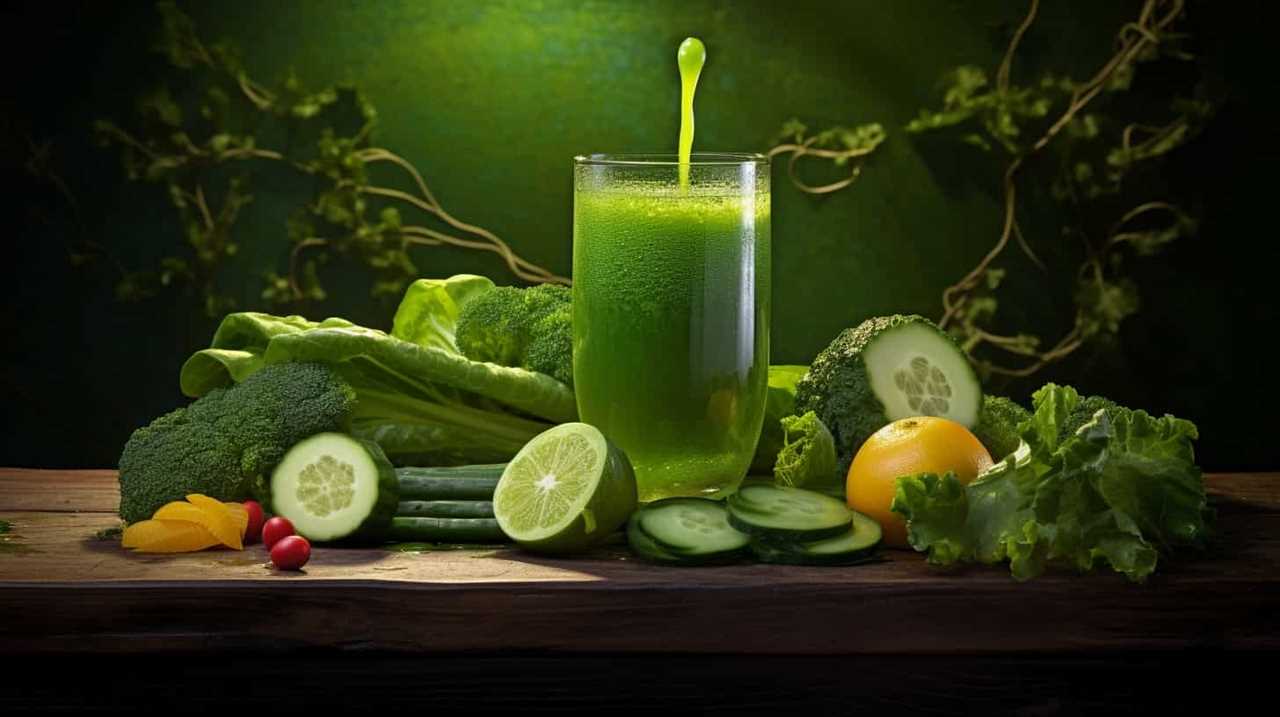
It’s important to start with the right pitcher. Look for a pitcher that’s made of glass or BPA-free plastic, as these materials won’t affect the taste of the lemonade. The pitcher should also have a lid or cover to keep the lemonade fresh and prevent spills.
Now, let’s talk about the lemons. While bottled lemon juice is convenient, using fresh lemons instead can elevate the flavor of your lemonade. Choose lemons that are firm and have a bright yellow color. Give them a gentle squeeze to ensure they’re juicy. To extract the juice, you’ll need a citrus juicer or a reamer. These tools make it easy to get every last drop of juice from the lemons.
Mixing the Lemonade Concentrate
To start mixing the lemonade concentrate, we’ll slowly pour the bottled lemon juice into the pitcher. It’s important to choose the right container for the lemonade concentrate. A pitcher with a lid or a tightly sealed container will help maintain the freshness and prevent any spills or leaks. Once the lemon juice is in the pitcher, we can move on to the next step of adding water and sweetener.
To ensure the lemonade concentrate stays fresh, it’s essential to store it properly. Keep the pitcher in the refrigerator to maintain its cool temperature and prevent any bacteria growth. If you have any leftover concentrate, transfer it to a smaller container with an airtight lid before refrigerating. This will help retain its flavor and prevent any contamination.

Now that we’ve mixed the lemonade concentrate, it’s time to adjust the sweetness and tartness to taste.
Adjusting the Sweetness and Tartness to Taste
We can adjust the sweetness and tartness of the lemonade to taste by adding more sugar or lemon juice, respectively. If you prefer a sweeter lemonade, simply add more sugar and stir until it dissolves completely. You can experiment with different sweeteners such as honey or agave syrup to find the perfect balance of sweetness.
On the other hand, if you want a tangier lemonade, add more lemon juice gradually, tasting as you go until it reaches your desired level of tartness.
Additionally, you can get creative with your lemonade by adding flavors like fresh mint leaves or a hint of lavender. These additions can elevate the flavor profile and create a more refreshing and unique experience.

Now that we’ve adjusted the sweetness and tartness of our lemonade, let’s move on to serving and enjoying your refreshing glass of lemonade.
Serving and Enjoying Your Refreshing Glass of Lemonade
Now let’s sit back, relax, and savor our refreshing glass of lemonade.
When it comes to serving and enjoying this delightful drink, there are a few techniques and garnishing options to consider.
Firstly, serving your lemonade chilled is essential for maximum enjoyment. Ensure that you have chilled glasses or add ice cubes to the glasses before pouring the lemonade.

To add a touch of elegance, you can garnish your lemonade with a slice of lemon on the rim of the glass. For an extra burst of flavor, you could also add a sprig of fresh mint or a few berries.
Remember to gently stir the lemonade before serving to evenly distribute the flavors.
Now, take a sip, feel the refreshing tang of lemon, and let the sweet and tart flavors dance on your taste buds.
Cheers!
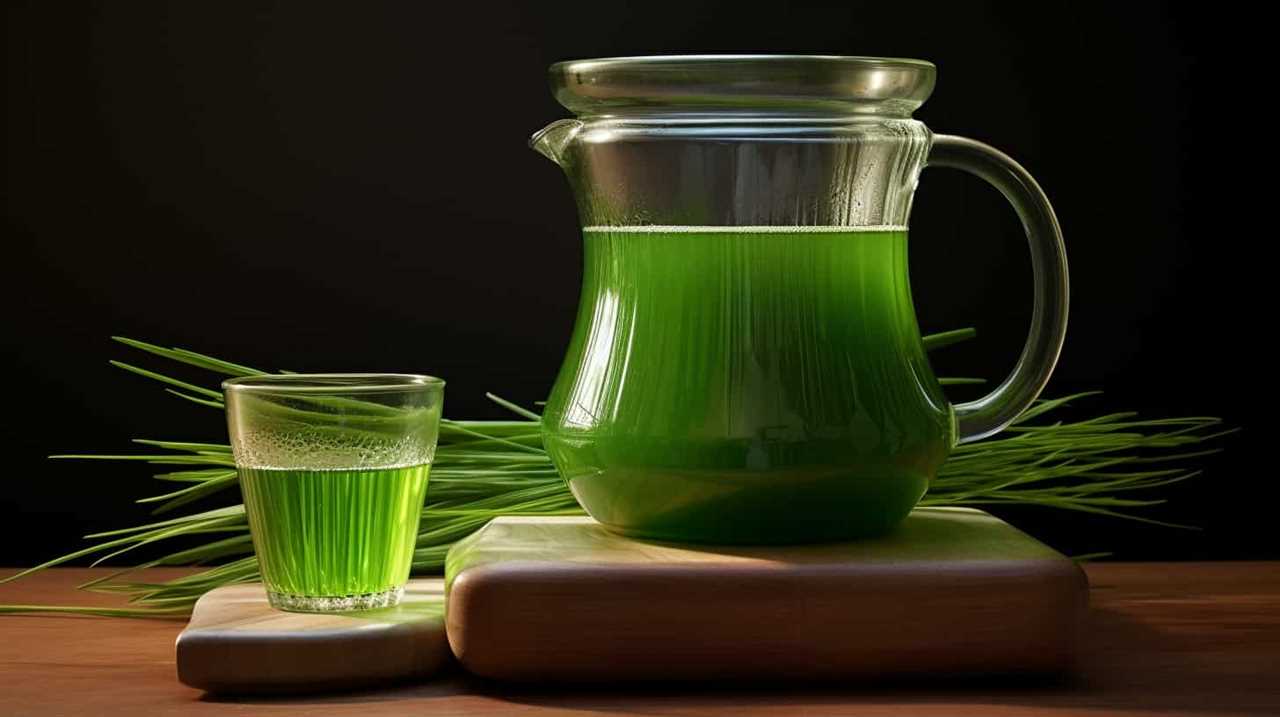
Frequently Asked Questions
Can I Use Fresh Lemons Instead of Bottled Lemon Juice?
Fresh lemons offer numerous benefits over bottled lemon juice. The taste of fresh lemons is unparalleled, providing a vibrant and tangy flavor. Incorporating fresh lemons into your lemonade will elevate its taste and give it a refreshing and authentic twist.
Can I Substitute Sugar With a Different Sweetener?
Substituting sweeteners in lemonade can enhance the flavor and offer health benefits. We’re knowledgeable about alternative sweeteners and can provide precise, detailed instructions on using them in place of sugar.
How Long Does the Lemonade Concentrate Need to Chill in the Refrigerator?
The chilling time for the lemonade concentrate in the refrigerator is typically around 1-2 hours. Using bottled lemon juice offers the benefit of convenience and consistent flavor for a refreshing glass of lemonade.
Can I Add Other Fruits or Flavors to the Lemonade?
Sure, we can definitely add different fruits or flavors to our lemonade. It’s a great way to experiment with unique flavors and create refreshing, personalized drinks. The possibilities are endless!

How Long Does the Lemonade Stay Fresh in the Refrigerator?
Lemonade made with bottled lemon juice can stay fresh in the refrigerator for about 5-7 days. To maximize shelf life, store it in an airtight container and keep it chilled.
Conclusion
And so, with a few simple steps and the right ingredients, a glass of refreshing lemonade is born.
Like a symphony of flavors dancing on your taste buds, this tangy elixir quenches thirst and brings joy on a hot summer day.
Just a sip transports you to a world of citrusy delight, where the sweetness and tartness blend harmoniously.

So go ahead, indulge in the art of lemonade-making and savor every drop of this sun-kissed nectar.
Cheers to the perfect glass of lemonade!
Susannah expertise lies in researching and compiling evidence-based content on juicing, nutrition, and overall health. She is committed to ensuring that The Juicery World offers accurate, up-to-date, and trustworthy information to empower readers to take control of their health. Susannah’s goal is to inspire individuals to embrace juicing as a way to nourish their bodies and live their best lives.
Juice Tips and Tricks
How to Know if Orange Juice Is Bad

We’ve all been in that situation before – reaching for a glass of orange juice and hesitating, unsure if it’s still okay to drink. Fear not! This article will give you the knowledge you need to determine for sure if your orange juice is still fresh or if it’s gone bad.
With a blend of scientific precision and practical tips, we’ll explore color changes, strange smells, off taste, texture changes, and mold or growth that may indicate spoilage.
Let’s dive in and serve ourselves a refreshing glass of certainty!
Key Takeaways
- Color changes in orange juice can indicate a loss of freshness and shelf life extension, but it doesn’t necessarily mean the juice is bad.
- Unusual or off-putting odors in orange juice, such as sour or fermented scents, can be a sign of poor quality.
- An off taste in orange juice, such as sour, bitter, or fermented flavors, suggests that the juice is spoiled.
- Texture changes in orange juice, such as pulp separation or a thicker consistency, can occur as the juice ages, so it’s important to consume it before the expiration date.
Color Changes in Orange Juice
We should be aware that color changes can indicate whether orange juice is bad.

When it comes to orange juice, color is a crucial factor to consider. As oranges are exposed to air, an oxidation process occurs, which leads to changes in color. Fresh orange juice has a vibrant orange hue, indicating its freshness and high nutritional value.
However, as time passes, the juice may undergo a color change, turning dull or brownish. This change in color is a result of the oxidation process, which affects the flavor and quality of the juice. It’s important to note that while a change in color doesn’t necessarily mean the juice is bad, it does indicate that the juice is losing its freshness and shelf life extension.
Therefore, it’s advisable to consume orange juice when it’s at its freshest, as indicated by its vibrant orange color.
Strange Smells in Orange Juice
When it comes to evaluating orange juice, we should be cautious of any strange smells or odors. A fresh, pleasant smell is indicative of good quality orange juice. However, if you notice any unusual or off-putting odors, it may be a sign that the juice has gone bad. These smells can range from a sour or fermented scent to a rancid or moldy aroma.

It’s important to note that while some natural variations in scent can occur due to the specific variety of oranges used, any strong or unpleasant smells should raise concerns. If you have citrus fruit allergies, it’s especially important to pay attention to the smell of orange juice, as it could indicate the presence of spoilage or contamination.
Ensuring the quality of orange juice is essential as it’s a popular beverage known for its health benefits, including being rich in vitamin C and antioxidants.
Off Taste of Orange Juice
Our taste buds can detect even the slightest hint of an off taste in orange juice, which can indicate that it has gone bad. The taste of orange juice should be fresh, tangy, and slightly sweet. If it tastes sour, bitter, or fermented, it’s likely spoiled.
One common cause of an off taste in orange juice is the use of overripe oranges. When oranges become overripe, their flavor profile changes, resulting in a less pleasant taste. Another factor to consider is the expiration date. Orange juice that has passed its expiration date is more likely to develop an off taste. It’s important to check the expiration date before consuming orange juice to ensure its freshness and quality. Additionally, improper storage conditions, such as leaving the juice at room temperature for extended periods, can lead to the development of unpleasant flavors. Storing orange juice in the refrigerator helps maintain its freshness for longer. For those exploring different juice options, aloe vera juice flavor tips suggest pairing tart juices with milder flavors to balance the overall taste.
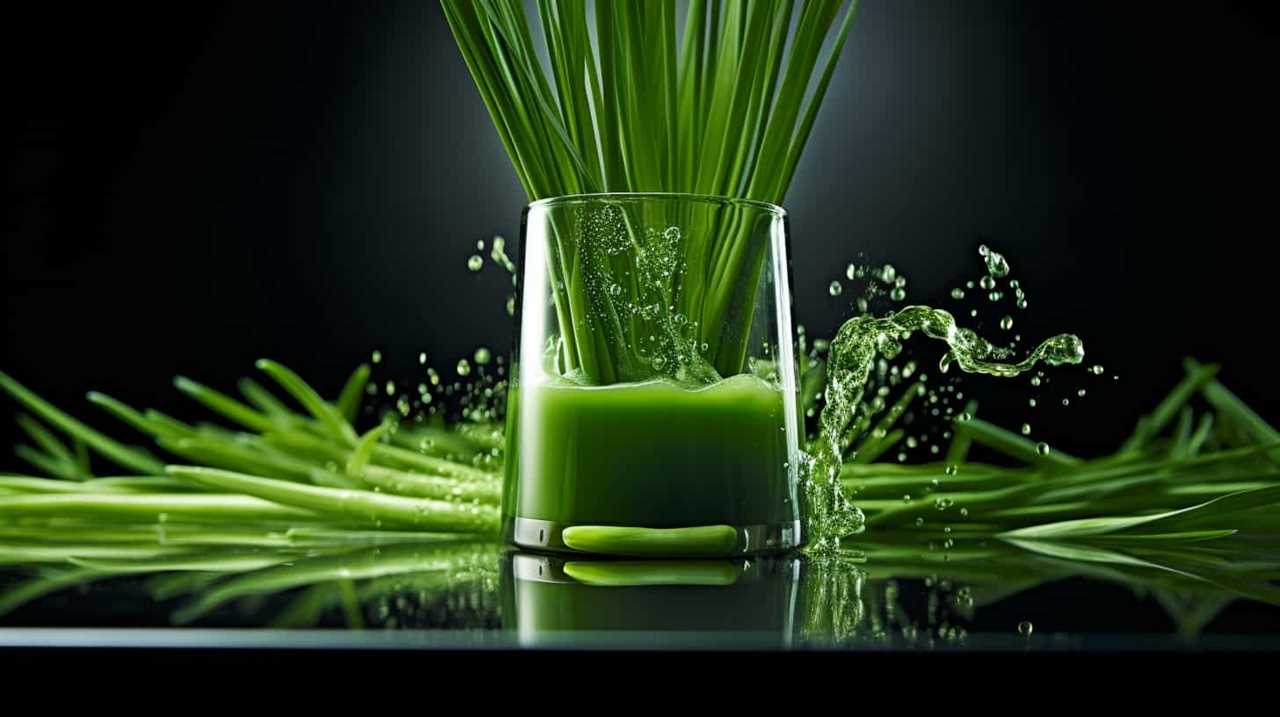
Now, let’s move on to discuss the texture changes in orange juice.
Texture Changes in Orange Juice
As we explore the texture changes in orange juice, it’s important to note that certain factors can cause it to become thicker or develop sediment. One common texture change in orange juice is pulp separation, where the pulp separates from the liquid and settles at the bottom. This can occur naturally over time, as the pulp particles become denser and sink.
Another factor that can affect the texture of orange juice is the expiration date. As orange juice ages, it may start to develop a thicker consistency and even form sediment. This is a result of the natural breakdown of the juice’s components. Therefore, it’s crucial to check the expiration date on orange juice and consume it before it reaches its expiration date to avoid any undesirable texture changes.
Mold or Growth in Orange Juice
We need to be aware of the possibility of mold or other growth occurring in orange juice. Mold can develop in orange juice if it isn’t stored properly or if it has passed its expiration date.
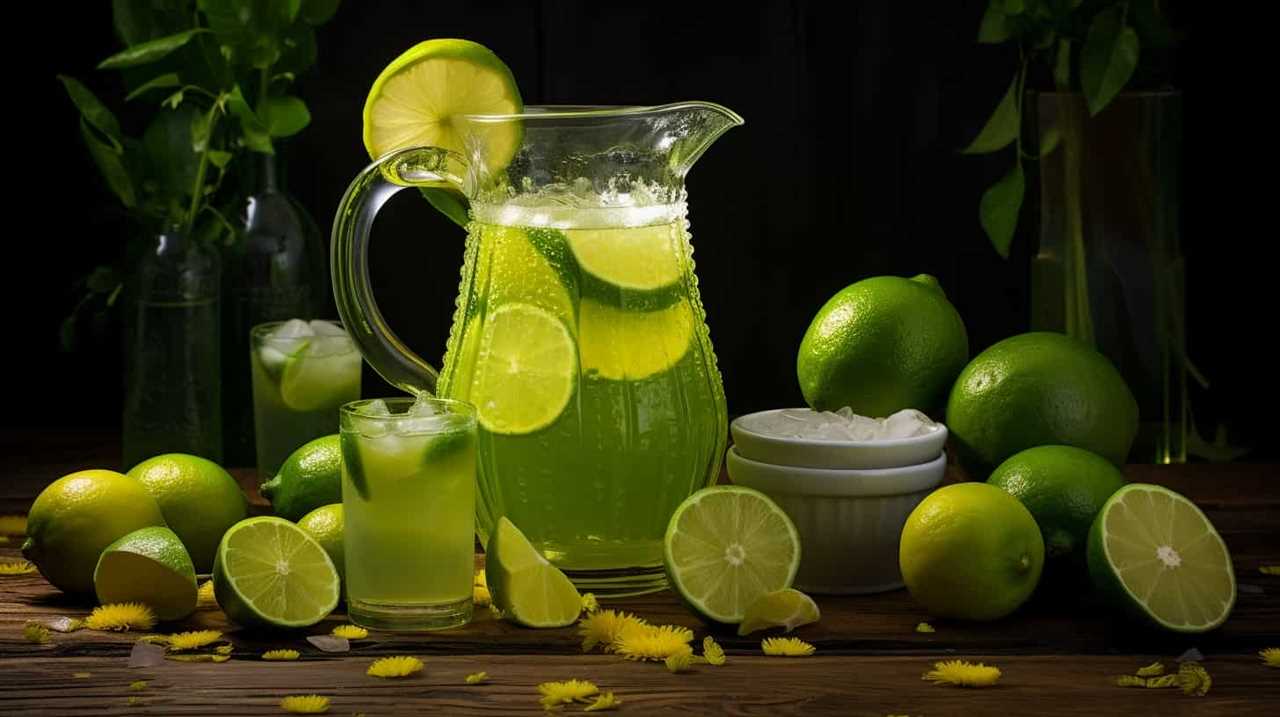
To prevent mold growth, it’s important to follow these steps:
- Store orange juice in the refrigerator at a temperature below 40°F (4°C).
- Check the expiration date on the bottle before consuming. Discard any orange juice that has expired.
- Keep the container tightly sealed to prevent air and moisture from entering, as these can promote mold growth.
Regularly inspecting orange juice for any signs of mold or unusual growth is essential. If you notice any discoloration, a strange odor, or visible mold, it’s best to discard the juice to avoid any potential health risks.
Frequently Asked Questions
Can Orange Juice Go Bad if It’s Stored in the Freezer for Too Long?
Frozen orange juice can potentially lose its nutrients and change its taste if stored in the freezer for too long. It is important to check for signs of spoilage before consuming it.
How Long Can Orange Juice Stay Fresh in the Refrigerator Once It’s Opened?
Once opened, orange juice can stay fresh in the refrigerator for about 7-10 days. To maintain its freshness, store it properly by keeping it tightly sealed and at a consistently cold temperature. If the orange juice develops an off odor, flavor, or appearance, it’s best to discard it to avoid any potential health risks. Factors like exposure to air and varying temperatures can influence how long orange juice lasts, so it’s crucial to handle it with care. Always check the expiration date as a general guide, but remember that proper storage can extend its freshness slightly. Additionally, avoid leaving the orange juice out at room temperature for extended periods, as this can significantly shorten how long orange juice lasts. Freezing the juice can be another option to extend its shelf life, but be aware that this may alter its texture and taste once thawed. By following these precautions, you can ensure your orange juice stays fresh and safe to consume.
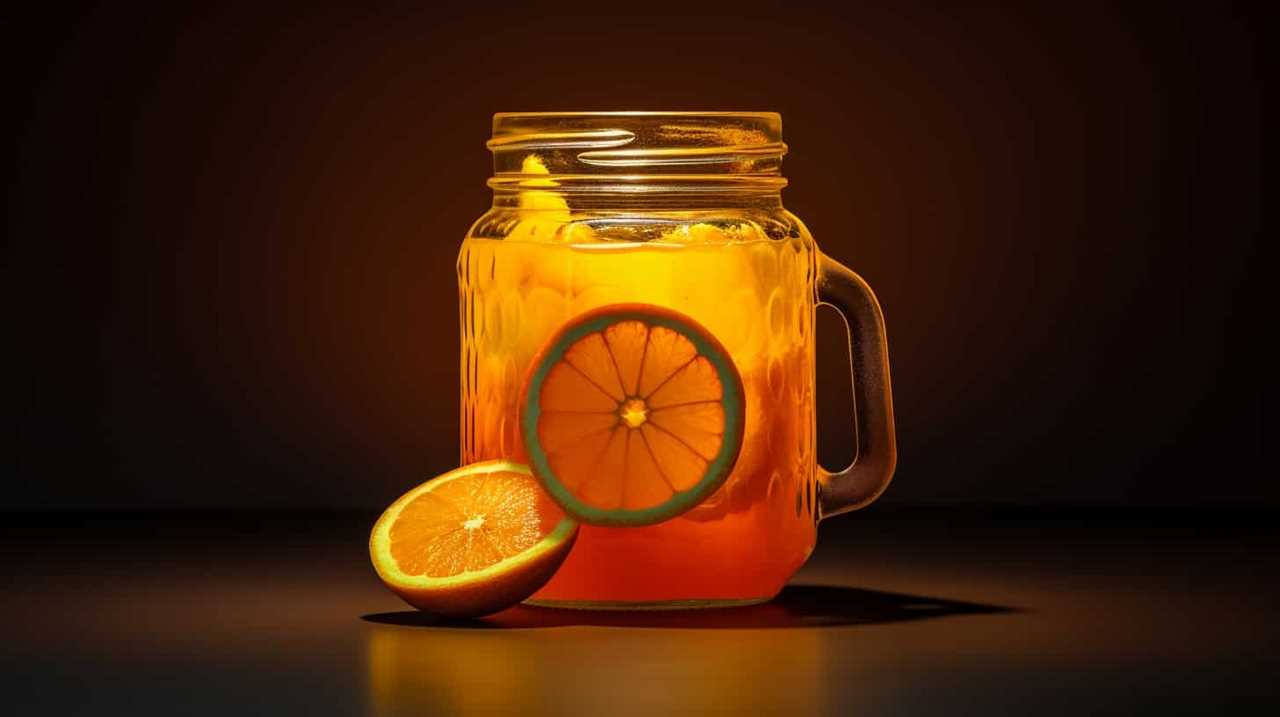
Is It Safe to Consume Orange Juice That Has Been Left Out at Room Temperature Overnight?
Left out orange juice may not be safe to drink as it can harbor harmful bacteria. Signs of spoiled orange juice include a sour smell, mold growth, and a change in color or taste.
Can Orange Juice Develop Harmful Bacteria if It’s Past Its Expiration Date but Still Looks and Smells Fine?
Orange juice can cause food poisoning if it develops harmful bacteria, even if it looks and smells fine. Signs of spoiled orange juice include a sour smell, mold growth, and a change in color or taste.
Does the Nutritional Value of Orange Juice Decrease as It Starts to Go Bad?
As orange juice goes bad, its nutritional value decreases. The longer it sits on the shelf, the more nutrients it loses. Signs of spoilage include a sour smell, off taste, and mold growth.
Conclusion
In conclusion, determining if orange juice is bad requires careful observation of color changes, strange smells, off taste, and texture changes. Just like a detective investigating a case, we must rely on our senses to detect any signs of spoilage.
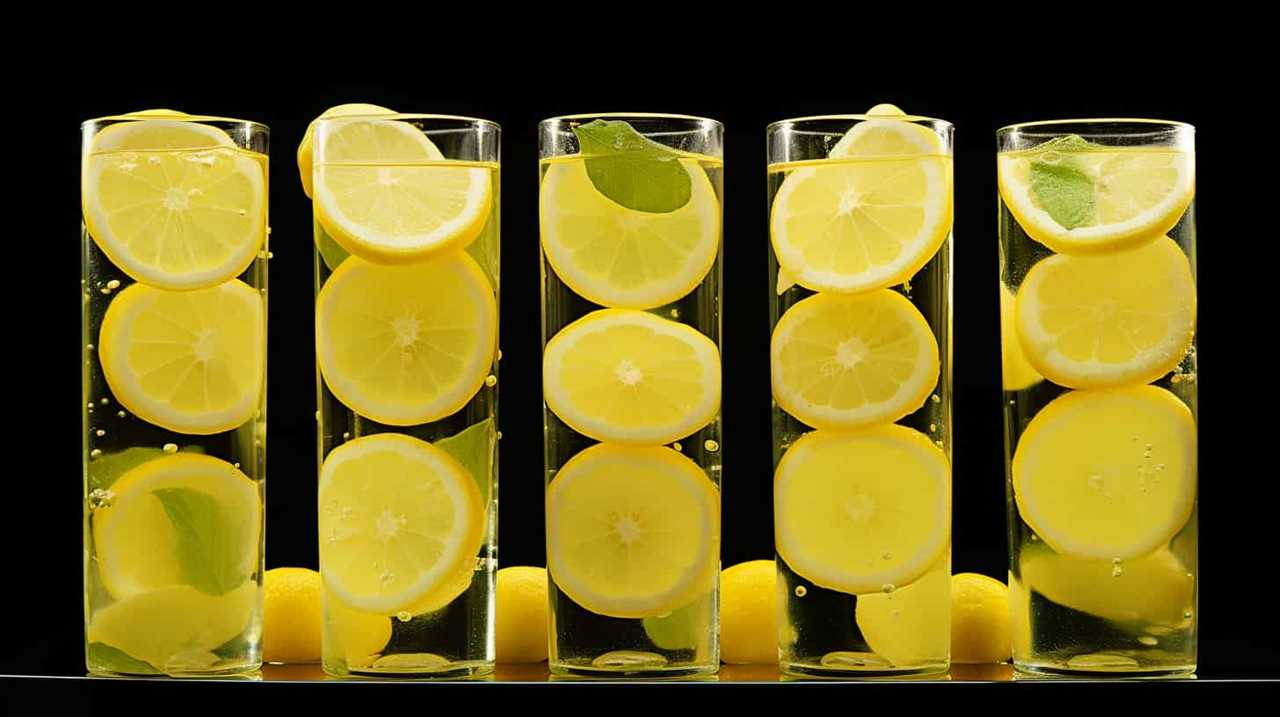
If we detect mold or growth in the orange juice, it’s a clear indication that it’s no longer safe to consume. By remaining vigilant and attuned to these indicators, we can ensure that our orange juice is always fresh and enjoyable.
Susannah expertise lies in researching and compiling evidence-based content on juicing, nutrition, and overall health. She is committed to ensuring that The Juicery World offers accurate, up-to-date, and trustworthy information to empower readers to take control of their health. Susannah’s goal is to inspire individuals to embrace juicing as a way to nourish their bodies and live their best lives.
-

 Vetted2 months ago
Vetted2 months ago15 Best Juices for Diabetics: Refreshing Options That Won’t Spike Your Blood Sugar
-

 Vetted2 months ago
Vetted2 months ago15 Best Decaf Coffee Options for Flavor Lovers Who Need a Caffeine Break
-

 Vetted2 months ago
Vetted2 months ago15 Best Espresso Ground Coffees to Elevate Your Morning Brew
-

 Vetted2 months ago
Vetted2 months ago15 Best K-Cup Coffee Pods for a Perfect Brew Every Time
-

 Vetted2 months ago
Vetted2 months ago15 Best Beans for Espresso: A Guide to Perfecting Your Brew
-

 Vetted2 months ago
Vetted2 months ago15 Best Inexpensive Espresso Machines That Brew Quality Coffee on a Budget
-

 Vetted2 months ago
Vetted2 months ago15 Best Kona Coffees to Savor the Rich Flavors of Hawaii
-

 Vetted2 months ago
Vetted2 months ago15 Best Cold Brew Coffees to Keep You Refreshed All Summer Long






